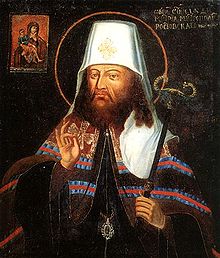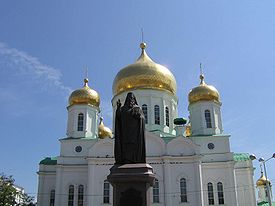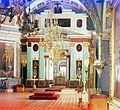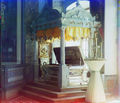- Dimitry of Rostov
-
Saint Dimitry of Rostov 
20th-century icon of St. Dimitry of RostovHierarch Born December 1651
Makarovo, Kiev regionDied 28 October 1709
RostovHonored in Eastern Orthodox Church Canonized 22 April 1757 by Russian Orthodox Church Feast 21 September (Uncovering of Relics)
28 October (Repose)
23 May (Synaxis of All Saints of Rostov)[1]Attributes Vested as a bishop, right hand raised in blessing Saint Dimitry of Rostov (sometimes Latinized as Demetrius, sometimes referred to simply as Dmitri Rostovsky) was a leading opponent of the Caesaropapist reform of the Russian Orthodox church promoted by Feofan Prokopovich. He is representative of the strong Ukrainian influence upon the Russian Orthodox Church at the turn of the 17th and 18th centuries. He is separately credited as composer or compiler of the first Russian opera, the lengthy Rostov Mysteries of 1705, though the exact nature of this work, as well as its place in history, is open to debate.[2]
Contents
Life
Born Danylo Savvich Tuptalo (or Tuptalenko, according to some sources) into a Cossack family in 1651. Soon thereafter his family moved to Kiev, and he entered the Kievo-Mohyla Academy at the age of 11. On 9 July 1668 he took his religious vows at St. Cyril's Monastery in Kiev and was given the monastic name of Dimitry (after Saint Demetrius of Thessalonika). After a brief period in Chernigov, Dimitry went to venerate the Byzantine Slavic Christian shrines of Belarus (at the time property of the Byzantine Rite Belorusian and Ukrainian Catholic metropolitans of the Uniate churches), still located in the Polish-Lithuanian Commonwealth at that time. In 1678 he returned from Vilno to Baturyn and settled at the court of the hetman Ivan Samoylovych.
During the 1680s, Dimitry lived mostly at the Kiev Pechersk Lavra, while his sermons against hard drinking and lax morals made his name known all over Russia. He was appointed hegumen (superior) of several major monasteries of Ukraine, but concentrated his attention upon the ambitious project of integrating all the lives of Russian saints into a single work, which he published as Monthly Readings (Четьи-минеи) or Menologion in 1684-1705. He also found time to study ecclesiastical history of the Russian Orthodox Church.
In 1701 Dimitry was appointed Metropolitan of Siberia but, pleading ill health, preferred to stay in Moscow until he was invested with the archbishopric of Rostov. During his life in Russia, Dimitry opposed both the Old Believers' and Peter the Great's ecclesiastical policies, gradually drifting towards the party of Eudoxia Lopukhina and Tsarevich Alexis. He also made invaluable contributions to the Russian education, opening a school and a small theatre in Rostov, where his own plays could be staged.
Work as Composer
Dimitry was also active as a composer, although his musical education is undocumented aside from the standard music curriculum established by Feofan Prokopovich at the Kiev-Mohyla Academy. Many of his Penitential Psalms achieved wide circulation, not only in the Ukraine but in the Balkans too, and many have become an integral part of Ukrainian folk-song tradition through the kobzari, itinerant blind singers.
Dimitry is credited as composer or compiler of the first Russian opera, the six-hour-long Rostov Mysteries of 1705. Though this has been staged, notably by Boris Pokrovsky's Moscow Chamber Musical Theatre, in Moscow and at the Brighton Festival (1993), it may best be judged an oratorio on the lives of Russian saints. Its basis is the "Cheti-Minei" (Четьи-Минеи), published in four volumes in 1689, 1690, 1700 and 1705[3] — the same source that inspired Pushkin in 1825 to write Boris Godunov.
Death
Upon Dimitry's death on October 28, 1709 his relics were placed at St. Jacob's Monastery, which his followers would rebuild as Dimitry's shrine. A fortress on the Don River was named after him; today it is known as Rostov-on-the-Don.
-
Saint Dimitry of Rostov (18th-century painting from the Museum of Ukrainian Art in Kiev).
-
Reliquary with Dmitry's remains (photo 1913).
References
- ^ Great Synaxaristes: (Greek) Σύναξις πάντων τῶν ἐν Ροστὼβ – Γιαροσλὰβλ διαλαμψάντων Ἁγίων. 23 Μαΐου. ΜΕΓΑΣ ΣΥΝΑΞΑΡΙΣΤΗΣ.
- ^ http://www.independent.co.uk/arts-entertainment/classical-music--imelda-macbeth-turns-catcalls-to-cheers-2324717.html (last two paragraphs)
- ^ http://www.pravda.ru/faith/religions/orthodoxy/04-10-2011/1093952-chetii-0/
This article incorporates material from the public domain 1906 Brockhaus and Efron Encyclopedic Dictionary.
External links
- Chrysostom Press Translations of St Dimitry's Lives of the Saints
- Repose of St Demetrius, Metropolitan of Rostov Orthodox icon and synaxarion
- Uncovering of the relics of St Demetrius the Metropolitan of Rostov icon and synaxarion
- Prelate Dimitry of Rostov www.fatheralexander.org
Categories:- Wikipedia articles incorporating text from Brockhaus-Efron
- Eastern Orthodox archbishops
- Eastern Orthodox saints
- Russian saints
- Ukrainian saints
- Alumni of the National University of Kyiv-Mohyla Academy
- 1651 births
- 1709 deaths
- 18th-century Christian saints
-
Wikimedia Foundation. 2010.





